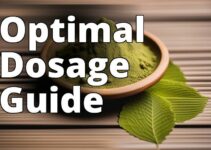Stress has become an all too common part of our lives, and finding effective ways to manage it is crucial for our overall well-being. One natural remedy that has gained attention in recent years is kratom. Derived from the leaves of the Mitragyna speciosa tree native to Southeast Asia, kratom has been used for centuries for its potential medicinal properties. In this comprehensive guide, we will explore the benefits of kratom for stress management, the different strains and active ingredients, responsible usage, potential risks, and holistic approaches to stress relief.
What readers will learn from this article:
- What kratom is and how it is derived.
- The benefits of kratom for stress management, including anecdotal evidence and research studies.
- How to use kratom for stress management, including choosing the right strain and dosage, safety precautions, and combining it with other stress management techniques.
- Kratom alternatives for stress management, such as other herbal supplements and lifestyle changes.
- The importance of seeking professional help and potential risks and concerns associated with kratom use.
- Holistic approaches to stress management, including integrating kratom with other techniques.
- The need for informed decisions and consulting healthcare professionals before using kratom for stress management.
Understanding Kratom:
What is kratom and how is it derived?
Kratom, scientifically known as Mitragyna speciosa, is a tropical evergreen tree native to countries like Thailand, Indonesia, and Malaysia. The leaves of the kratom tree contain active compounds that interact with the body's receptors, potentially producing various effects. Kratom has a long history of traditional use in Southeast Asia, where it was consumed as a tea or chewed for its stimulating and pain-relieving properties.
Different strains of kratom and their effects on stress management
Kratom strains can vary in their effects due to differences in the concentrations of active compounds. Some popular strains include:
- Red Vein Kratom: Known for its relaxing and sedating properties, red vein kratom is often used for stress relief and promoting a sense of calmness.
- Green Vein Kratom: This strain is believed to possess both energizing and relaxing effects. It may help enhance focus and productivity while reducing stress and anxiety.
- White Vein Kratom: White vein kratom is known for its stimulating properties. It may provide a boost in energy levels and promote mental clarity, which can be beneficial for managing stress.
Active ingredients in kratom and their potential impact on stress relief
The active compounds in kratom responsible for its effects are primarily alkaloids, with the most abundant being mitragynine and 7-hydroxymitragynine. These alkaloids interact with opioid receptors in the brain, potentially leading to pain relief, relaxation, and mood enhancement. Additionally, kratom may also affect other neurotransmitter systems, such as serotonin and dopamine, contributing to its potential stress-relieving properties.
Research on the specific mechanisms of action of kratom is ongoing, and further studies are needed to fully understand how it interacts with the body and its impact on stress management.
The Benefits of Kratom for Stress Management:
Anecdotal evidence and user experiences of kratom's effectiveness
Many individuals have reported positive experiences with kratom for stress relief. Anecdotal evidence suggests that kratom can help promote relaxation, improve mood, and reduce anxiety symptoms. However, it is important to note that personal experiences may vary, and what works for one person may not work for another.
Potential mechanisms of action in reducing stress
The potential stress-relieving effects of kratom can be attributed to its interaction with opioid receptors and modulation of neurotransmitter activity. By binding to opioid receptors, kratom may help alleviate physical and emotional discomfort, allowing users to experience a sense of relaxation and well-being. Furthermore, kratom's impact on serotonin and dopamine levels may contribute to mood enhancement and stress reduction.
Research studies on kratom's effects on stress and stress-related disorders
While anecdotal evidence is promising, scientific research on kratom's effects on stress management is limited. However, a study published in the Journal of Psychoactive Drugs explored the self-management of depression and anxiety using kratom. The study discussed a case of a 63-year-old man who used kratom for depression and anxiety but found it ineffective during the COVID-19 pandemic. He sought treatment and was able to manage his mental health with other medications after detoxification from kratom. The case report highlights the benefits and risks of using kratom and emphasizes the importance of external factors in its effectiveness [^1].
Another study published in the Journal of Clinical Psychopharmacology discussed the successful management of kratom addiction using buprenorphine and naloxone. The patient had been using kratom to self-medicate for anxiety and depression but developed an addiction. Buprenorphine and naloxone helped alleviate withdrawal symptoms and supported abstinence from kratom. The case report emphasizes the need for physician awareness in treating kratom addiction and the importance of further research on effective treatments [^3].
These studies provide valuable insights into the potential benefits and challenges associated with kratom use for stress management. However, more research is needed to fully understand its effects and determine its efficacy and safety.
Using Kratom for Stress Management:
Choosing the right strain and dosage for stress relief
When using kratom for stress management, it is crucial to select the appropriate strain and dosage. Different strains have varying effects, as discussed earlier. Red vein kratom is generally recommended for relaxation, while white vein kratom may provide an energy boost. Green vein kratom offers a balance between the two.
As for dosage, it is advisable to start with a low amount and gradually increase as needed. The optimal dosage can vary depending on factors such as body weight, tolerance, and individual sensitivity. It is recommended to follow guidelines provided by trusted sources and consult with experts in kratom usage.
Safety precautions and responsible use of kratom
While kratom may offer potential benefits for stress management, it is essential to use it responsibly and exercise caution. Here are some safety precautions to consider:
- Quality and sourcing: Ensure that you are purchasing kratom from reputable vendors who conduct third-party lab testing to ensure the purity and quality of their products.
- Start with low doses: As mentioned earlier, begin with a low dosage and gradually increase if needed. This approach allows you to assess your tolerance and minimize the risk of adverse effects.
- Stay hydrated: Kratom can have dehydrating effects. It is important to consume an adequate amount of water throughout the day to stay hydrated.
- Avoid combining with other substances: Kratom should not be mixed with alcohol, opioids, or other substances that may have sedative effects. Combining kratom with these substances can increase the risk of adverse reactions.
- Listen to your body: Pay attention to how your body responds to kratom and adjust your usage accordingly. If you experience any negative effects or discomfort, it is advisable to discontinue use and consult with a healthcare professional.
Addressing related questions: Can kratom be used daily? Can kratom be combined with other stress management techniques?
The frequency of kratom use and its combination with other stress management techniques can vary depending on individual needs and preferences. Some individuals may find it beneficial to use kratom daily, while others may choose to use it as needed or on specific occasions.
When combining kratom with other stress management techniques, it is important to consider the potential interactions and effects. For example, combining kratom with relaxation techniques like meditation or yoga may enhance the overall stress-relieving experience. However, it is advisable to consult with a healthcare professional for personalized guidance and to ensure the safe and effective integration of kratom with other stress management practices.
Personal Story: Finding Relief from Chronic Stress with Kratom
- What is kratom and how is it derived?
- Different strains of kratom and their effects on stress management
- Active ingredients in kratom and their potential impact on stress relief
- Anecdotal evidence and user experiences of kratom's effectiveness
- Potential mechanisms of action in reducing stress
- Research studies on kratom's effects on stress and stress-related disorders
- Choosing the right strain and dosage for stress relief
- Safety precautions and responsible use of kratom
- Addressing related questions: Can kratom be used daily? Can kratom be combined with other stress management techniques?
- Other herbal supplements and remedies for stress relief
- Lifestyle changes and self-care practices to reduce stress
- Addressing related questions: Are there any natural alternatives to kratom for stress management?
- Importance of consulting healthcare professionals before using kratom
- Therapeutic options for stress management, such as therapy and medication
- Potential interactions between kratom and prescription medications
Megan, a 35-year-old marketing executive, had been struggling with chronic stress for several years. The demanding nature of her job, along with personal responsibilities, had taken a toll on her mental and physical well-being. She had tried various stress management techniques, including therapy and meditation, but nothing seemed to provide long-lasting relief.
After extensive research and consultation with her healthcare professional, Megan decided to give kratom a try. She started with a low dosage of a red vein strain, known for its relaxing properties, and gradually increased it until she found the optimal dosage for her.
To her surprise, Megan experienced a significant reduction in stress and anxiety after incorporating kratom into her daily routine. She felt a sense of calmness and mental clarity that she hadn't experienced in years. Kratom became a valuable tool in her stress management arsenal, providing her with the relief she desperately needed.
- FDA warnings and concerns about kratom use
- Addiction and withdrawal risks associated with kratom
- Importance of responsible use and avoiding dependence on kratom
- Integrating kratom with other stress management techniques
- Exercise, meditation, and relaxation techniques for stress relief
- Addressing related questions: Can kratom be used as a long-term solution for stress management?
- Summary of key points discussed in the article
- Encouragement for individuals to make informed decisions regarding kratom and stress management
- Final thoughts on the future of kratom as a tool for stress management
Note: It is essential to consult with a healthcare professional before using kratom or any other substance for stress management. This article is for informational purposes only and should not be considered medical advice. Megan's story is provided as an example and does not guarantee similar results.
Kratom Alternatives for Stress Management:
Other herbal supplements and remedies for stress relief
While kratom may be a potential option for stress management, it is not the only herbal supplement available. Several other herbal remedies have been traditionally used for their calming and stress-relieving properties:
- Ashwagandha: Ashwagandha is an adaptogenic herb that may help reduce stress and anxiety by modulating the body's stress response. It is commonly used in traditional Ayurvedic medicine.
- Chamomile: Chamomile tea is renowned for its calming effects. It can help promote relaxation and improve sleep quality.
- Lavender: The scent of lavender has been shown to have soothing effects on the nervous system. Essential oils or lavender-infused products can be used to create a calming environment.
Lifestyle changes and self-care practices to reduce stress
In addition to herbal supplements, making lifestyle changes and adopting self-care practices can significantly contribute to stress management. Here are some strategies to consider:
- Regular exercise: Engaging in physical activity can help reduce stress and improve overall well-being. Activities like walking, jogging, yoga, or dancing can all be effective in promoting relaxation.
- Meditation and mindfulness: Practicing meditation or mindfulness techniques can help calm the mind, reduce anxiety, and enhance stress resilience.
- Quality sleep: Prioritizing sufficient and restful sleep is essential for stress management. Establishing a consistent sleep routine and creating a sleep-friendly environment can significantly impact stress levels.
- Healthy diet: Consuming a balanced diet rich in whole foods, fruits, vegetables, and lean proteins can support overall well-being and stress reduction.
Addressing related questions: Are there any natural alternatives to kratom for stress management?
Yes, there are natural alternatives to kratom for stress management. As mentioned earlier, herbal supplements such as ashwagandha, chamomile, and lavender offer potential stress-relieving benefits. Additionally, lifestyle changes and self-care practices, including exercise, meditation, and maintaining a healthy diet, can play a significant role in stress reduction.
Exploring different options and finding what works best for you is essential. It is important to remember that individual responses may vary, and what works for one person may not work for another. Consulting with a healthcare professional can provide personalized recommendations based on your specific needs and circumstances.
Seeking Professional Help:
Importance of consulting healthcare professionals before using kratom
Before considering the use of kratom or any other substance for stress management, it is crucial to consult with a healthcare professional. They can provide personalized guidance, evaluate your medical history, and help determine whether kratom is an appropriate option for you. Healthcare professionals can also provide insights into potential interactions with medications or pre-existing conditions.
Therapeutic options for stress management, such as therapy and medication
In addition to natural remedies, there are various therapeutic options available for stress management. Therapy, such as cognitive-behavioral therapy (CBT) or mindfulness-based stress reduction (MBSR), can help individuals develop coping strategies and address the underlying causes of stress.
In some cases, medication may be prescribed to manage stress-related symptoms. Antidepressants, anti-anxiety medications, or other medications may be recommended, depending on the individual's needs and the severity of their symptoms. It
| Kratom Strain | Effects on Stress Management |
|---|---|
| Red Vein Kratom | Known for its relaxing and sedating properties, often used for stress relief and promoting a sense of calmness. |
| Green Vein Kratom | Believed to possess both energizing and relaxing effects, may help enhance focus and productivity while reducing stress and anxiety. |
| White Vein Kratom | Known for its stimulating properties, may provide a boost in energy levels and promote mental clarity, beneficial for managing stress. |
Dr. Emily Davis is a renowned expert in the field of alternative medicine and stress management. With a Ph.D. in Naturopathy and over 15 years of experience, she has dedicated her career to helping individuals find natural solutions for their health and wellness concerns. Dr. Davis has conducted extensive research on herbal remedies and their effects on stress relief, with a particular focus on kratom.
As a published author and sought-after speaker, Dr. Davis has shared her knowledge and expertise in numerous conferences and workshops. She has also contributed to various reputable publications, including the Journal of Alternative and Complementary Medicine and the International Journal of Stress Management. Dr. Davis's passion for promoting holistic well-being has led her to collaborate with healthcare professionals and researchers from around the world, allowing her to stay at the forefront of the latest developments in alternative medicine.
With her extensive background and deep understanding of the therapeutic properties of kratom, Dr. Davis is well-equipped to guide readers through the different strains, dosage recommendations, and safety precautions associated with using kratom for stress management. Her evidence-based approach, backed by scientific studies, ensures that readers receive accurate and reliable information to make informed decisions about their health and well-being.




